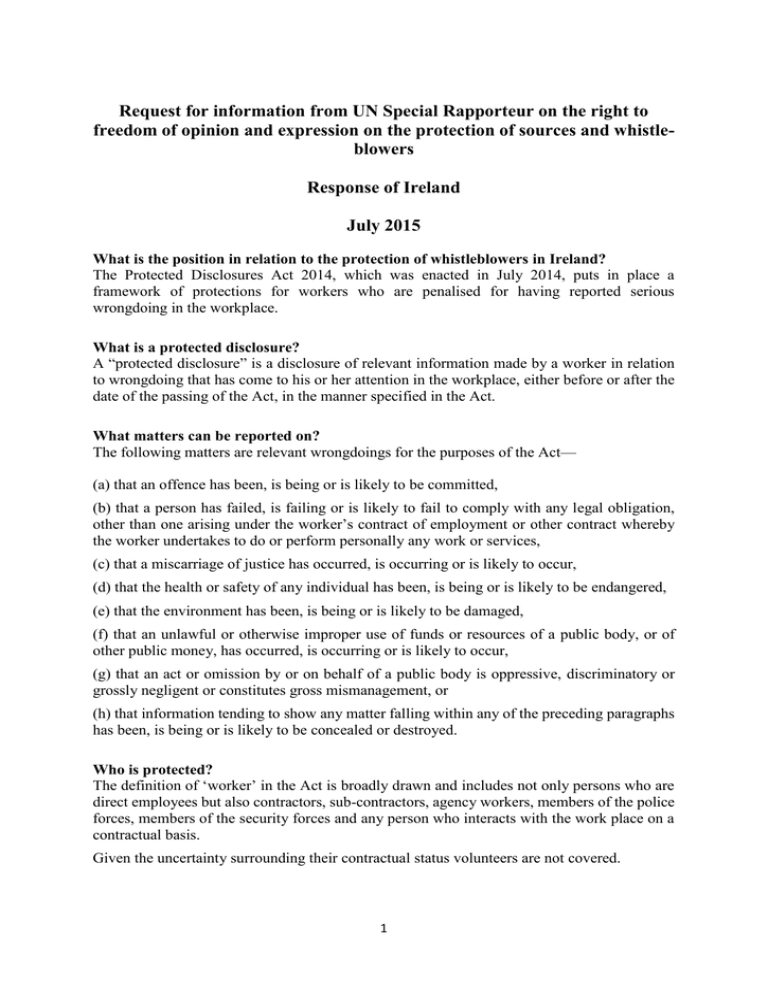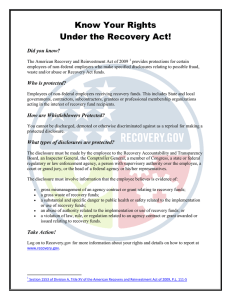Request for information from UN Special Rapporteur on the right... freedom of opinion and expression on the protection of sources...
advertisement

Request for information from UN Special Rapporteur on the right to freedom of opinion and expression on the protection of sources and whistleblowers Response of Ireland July 2015 What is the position in relation to the protection of whistleblowers in Ireland? The Protected Disclosures Act 2014, which was enacted in July 2014, puts in place a framework of protections for workers who are penalised for having reported serious wrongdoing in the workplace. What is a protected disclosure? A “protected disclosure” is a disclosure of relevant information made by a worker in relation to wrongdoing that has come to his or her attention in the workplace, either before or after the date of the passing of the Act, in the manner specified in the Act. What matters can be reported on? The following matters are relevant wrongdoings for the purposes of the Act— (a) that an offence has been, is being or is likely to be committed, (b) that a person has failed, is failing or is likely to fail to comply with any legal obligation, other than one arising under the worker’s contract of employment or other contract whereby the worker undertakes to do or perform personally any work or services, (c) that a miscarriage of justice has occurred, is occurring or is likely to occur, (d) that the health or safety of any individual has been, is being or is likely to be endangered, (e) that the environment has been, is being or is likely to be damaged, (f) that an unlawful or otherwise improper use of funds or resources of a public body, or of other public money, has occurred, is occurring or is likely to occur, (g) that an act or omission by or on behalf of a public body is oppressive, discriminatory or grossly negligent or constitutes gross mismanagement, or (h) that information tending to show any matter falling within any of the preceding paragraphs has been, is being or is likely to be concealed or destroyed. Who is protected? The definition of ‘worker’ in the Act is broadly drawn and includes not only persons who are direct employees but also contractors, sub-contractors, agency workers, members of the police forces, members of the security forces and any person who interacts with the work place on a contractual basis. Given the uncertainty surrounding their contractual status volunteers are not covered. 1 In addition to persons who are defined as workers under the Act, protection is also made available to third parties who may suffer detriment as a consequence of a protected disclosure having been made by another. What protections are available? Workers who are direct employees are provided with access to the existing industrial dispute resolution mechanisms of the State. Employees such as trainees and apprentices who are currently excluded from those mechanisms are provided with access to these mechanisms if they have been penalised for having made a protected disclosure. In the case of all workers who are employees, access to the mechanisms is granted on a day one basis without further restriction. In addition, the compensation payable under those mechanisms has been substantially increased in respect of persons penalised for having made a protected disclosure. In the case of workers who are not direct employees and who are operating under a contract for services an action in tort may be taken against the person who caused them detriment. Similar provisions apply in respect of third parties who claim to have suffered detriment as a consequence of the making of a protected disclosure by another person. How does a worker report his/her concerns? The Act sets out a “stepped disclosure regime”. The simplest form of disclosure, and the form which is to be encouraged, is to the employer where all that is a required is a reasonable belief that the information disclosed shows or tends to show that the wrongdoing is occurring. This is a deliberately low threshold designed to ensure that most reports are made to the person best place to correct the alleged wrongdoing – the employer. In the case of worker in a public body that worker may choose, as an alternative, to report to the relevant Minister. A worker may choose to report to an external regulatory body with functions in the area which are the subject of the allegations. In such a case the threshold for protection increases to a reasonable belief in the substantial truth of the matters reported. In reality this is not a significantly higher threshold. While the matter may subsequently prove not to be substantially true the existence of a reasonable belief remains paramount. A worker may choose to report externally to a member of the Oireachtas or to another external source such as the media. Any person proposing to make such an external report whilst at the same time attracting the protections must however satisfy a series of strictly drawn conditionalities set out in the Act. While it is possible to satisfy these conditionalities the stepped disclosure regime will tend to make disclosure directly to the employer or to an external regulatory body the easiest, and therefore preferable, option. Is there any restriction on the nature of the information that can be reported? No particular type of information is excluded from being reported under the Act. The Act does however recognise that certain types of information are more sensitive than others so that for example, the external reporting of matters relating to law enforcement can only be made to a member of the Oireachtas. In the case of information that might reasonably be expected to adversely affect the security, defence, or international relations of the State, a 2 specific disclosure route is set out which is designed to allow disclosure in a secure and confidential manner. Does a disclosure have to be made ‘in good faith’? The Act does not contain a ‘good faith’ test. Experience elsewhere has shown that the inclusion of such a test could call into question the discloser’s motivation for coming forward. A disclosure not made in ‘good faith’ must have been made in ‘bad faith’ thus calling into question the motivation for the making of the disclosure in the first instance. Ireland decided that even if the matters reported on subsequently proved not to be correct the discloser should be entitled to the protections of the Act provided he/she had a reasonable belief in the allegations made. Additionally it was considered to be a particularly unjust outcome that a person who correctly reported a wrongdoing might potentially find themselves without the protections simply as a consequence of their perceived motivation for reporting. It was considered therefore that the potential for the motivation of a discloser’s motivation to be questioned would act as a significant disincentive to potential whistleblowers coming forward in the first instance. Similar considerations were taken into account in relation to the imposition of a ‘public interest’ test and no such test is included. As a consequence the Act specifically states that the motivation for making a disclosure is irrelevant as to whether or not it is a protected disclosure. The only instance where motivation may become an issue relates to the award of compensation for penalisation following the making of a protected disclosure. In the event that the investigation of the relevant wrongdoing concerned is found not to have been the sole or main motivation for making the disclosure, the amount of compensation awarded may be reduced by up to 25 per cent less than the amount that it would otherwise be. Any question as to whether such a reduction should occur would of course be dependent on the circumstances of each individual case. Is the discloser’s identity maintained? The Act imposes an absolute burden of confidentiality on the recipient of a protected disclosure or any other person to whom the disclosure is referred in the performance of their duties. While a failure to comply with this absolute duty is actionable by the person who made the disclosure, if he/she suffers any loss by reason of that failure the Act also sets out a number of reasonable practical and pragmatic circumstances under which the absolute duty does not apply. Among these are where the recipient reasonably believes that the discloser has no objection to being identified (simply achieved by asking) or where the revelation of the identity of the discloser becomes necessary for the effective investigation of the complaint or where the revelation is necessary to prevent the commission of a crime. How does the Act compare with international standards and recommendations? In formulating the legislation Ireland had regard to the publications and recommendations of many international bodies in relation to the content of whistleblower protection legislation. Among these were the United Nations Convention Against Corruption, the G20 AntiCorruption Plan and subsequent report of the OECD, resolutions of the European Parliament and recommendations from the advocacy body Transparency International. 3 Significant efforts were made to ensure that the recommendations of these bodies were taken into account. As a result, the Act benchmarks very favourably with those recommendations and has been praised internationally as a leader in its field. How will employers deal with protected disclosures? The Act requires that every public body shall establish and maintain procedures for the making of protected disclosures by workers who are or were employed by the public body and for dealing with such disclosures. Written information in relation to those procedures must be provided to workers employed by the public body. The Minister for Public Expenditure will issue Guidance for the purpose of assisting public bodies in the performance of these functions and a number of engagements have taken place with public bodies in relation to the content of this Guidance. In addition to the Guidance for public bodies to be issued by the Minister the Labour Relations Commission, following discussion with employer and trade union representatives, close to finalising statutorily based Code of Conduct for employers and trade unions in relation to the making of and handling of disclosures made under the Act. Where can I get further information? The Protected Disclosures Act 2014 may be seen at – http://www.irishstatutebook.ie/2014/en/act/pub/0014/index.html Further information in relation to the Act and its operation to date can be obtained by contacting noel.tallon@per.gov.ie of the Department of Public Expenditure and Reform, Dublin 2. Government Reform Unit 4
